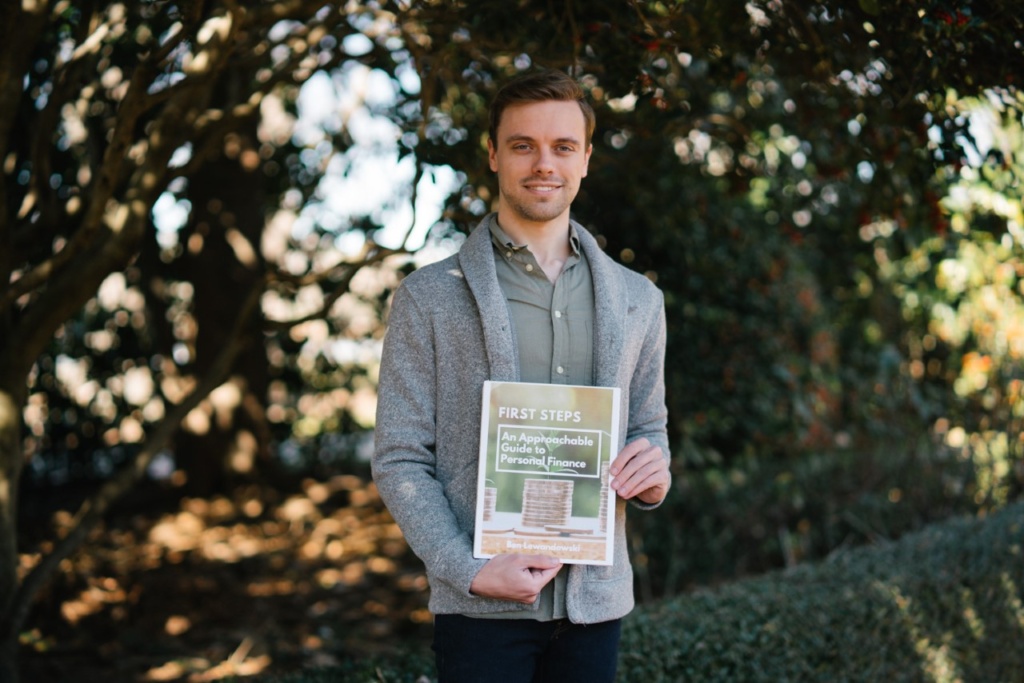Student loans and repayment. Credit card management. Vehicle insurance and maintenance. Budgeting and saving for college and beyond.
Personal finance questions arise for nearly every high school senior, whether they are making arrangements to attend college or planning to enter the workforce. Ill-informed decisions can create missed savings opportunities or even financial hardship.
Financial literacy issues impressed Benjamin Lewandowski, a 2020 summa cum laude BJU graduate, in his business administration courses; and prompted him to write a financial guide for high school and college students — and their parents — and recent college graduates. The book was published last month.
“First Steps: An Approachable Guide to Personal Finance” is available on Amazon.
Need for the Basics
A personal finance course is a high school requirement in only 21 states, according to data from Next Gen Personal Finance, and they are often scant in college.
“I kept hearing about how high schoolers and college students were lacking in what I would consider the basics of personal finances — everything from budgeting to spending wisely and making sure you plan for the future,” he said. “All those things, I believe, are essential to being a well-rounded adult. Handled poorly, they can contribute to a lot of stress.”
Two recent studies by AIG Insurance (American International Group) showed that students graduating high school do not have a high enough level of financial literacy to allow them to manage their money well in college. And, for many students, their first year of college is their first attempt at budgeting.
Four-year college students reported feeling less prepared to manage their money than any other factor in college life, including coursework, organizational skills and time management.
According to one of the studies, that carried over into their first year of “real life.”
“There is a lot of research that went into the topics in the book. What would be the most relevant to the specific audience? What are they most lacking in? I wanted to find the right way to present these topics that can be confusing and complex, especially if you have to face them for the first time, in an easily understandable and approachable way,” said Lewandowski, who was president of the University Marketing Association during the 2019–2020 academic year.
Saving and Investing Knowledge
Lewandowski learned early on the importance of money management, which has guided him through high school, at BJU and in the workplace during the current unstable American economy fueled by inflation.
“The book is divided into two sections — the different budgets you can arrange, starting with your first job in high school even if that’s mowing grass and you have $100 a week, up to a recent college graduate who is earning a salary and has to decide what portion of their money to set aside for everything from tithing to retirement,” said Lewandowski, a resident of Taylors, South Carolina.
“I talk about the different types of student loans because it’s good for high schoolers and college students to have a working knowledge of everything from a subsidized loan from the government to private loans. I get into how you can set aside money at any age to save for college and pay for college, and as a recent graduate buying things like a new car and saving for a downpayment of a house.”
Exercise Discipline
Peers have sought his financial advice, and he encourages current students and recent graduates to ask questions and research pertinent topics to gain solid footing.
“Find somebody who you trust and who has done a good job with their personal finances, whether that be a parent, teacher or grandparent, and feel comfortable asking questions,” the author said. “Even the most basic question can have multiple answers. Look at how you are spending your money and make sure you take care of the basics first and then move on to discretionary spending.
“It’s easy to get yourself in trouble when you have a steady income that you likely never had before. Personal finance is really a test of your self-discipline in a new environment and situation where you don’t have as many people looking out for your decisions as you’ve had in the past, and you have a larger degree of freedom.
“You have to know yourself, know what your weaknesses are when it comes to spending, and exercise self-control. Take care of the basics first. I’d like everyone to have a sound financial future.”








